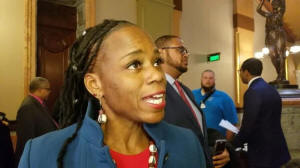Legislation would expand earned income tax credit and create child tax
credit
 Send a link to a friend
Send a link to a friend
 [March 15, 2022]
By Kevin Bessler | The Center Square [March 15, 2022]
By Kevin Bessler | The Center Square
(The Center Square) – With inflation
running rampant, some are calling for a change to income taxes for
low-income residents in Illinois.
Lawmakers and advocates say low-income families spend a larger share of
their income meeting basic needs, which has become difficult as prices
rise.
Two bills in the Illinois statehouse would expand the Earned Income
Credit (EIC) and create a Child Tax Credit (CTC), which sponsors say
will give nearly 5 million Illinoisans more cash at tax time.
“This has been proven to affect poverty,” Rep. Carol Ammons,
D-Champaign, sponsor of HB4920, said. “This is an anti-poverty policy
that we know works and gives people direct relief.”
Under the legislation, 1.2 more Illinoisans would be newly eligible for
EIC, and 3.6 million existing EIC recipients would receive more
financial support.
According to a report from the bipartisan Center for Tax and Budget
Accountability, spending on the EIC and CTC would create $1 billion in
local and statewide economic benefits.

[to top of second column]
|

Illinois state Rep. Carol Ammons,
D-Urbana
Greg Bishop | The Center Square

“It really is putting money back in worker’s pockets, so it is boosting
their earnings so that they are able to spend that in the economy,” said
Allison Flanagan, associate director of Budget and Policy for the CTBA.
“You get sort of this duplicative effect. It is helping the household
and those households are going and spending the money.”
The federal Build Back Better Act called for extending a temporary
federal child tax credit for at least one more year, but the legislation
has stalled.
Illinois currently does not have a CTC at the state level. Flanagan said
that in addition to alleviating poverty and stimulating the economy, the
refundability feature would create an effective, as well as
administratively facile, way to make the tax burden fairer.
“This bill would cost only 1% of the state’s total general fund revenue,
so it's such a small drop in the bucket for such a large impact,”
Flanagan said.
Kevin Bessler reports on statewide issues in Illinois for
the Center Square. He has over 30 years of experience in radio news
reporting throughout the Midwest.
|